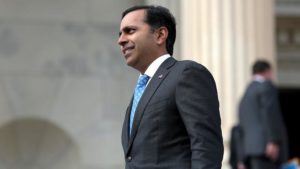Coffman, Krishnamoorthi, Introduce the ‘Immigration Innovation Act of 2018’

Protecting High-Skill Workers & Their Dependents
Washington, D.C. – Today, U.S. Representatives Mike Coffman (R-CO) and Raja Krishnamoorthi (D-IL) introduced, H.R. 6794, the ‘Immigration Innovation Act of 2018’ which would reform and streamline the H-1B high-skilled worker visa program while increasing investment in American Science, Technology, Engineering, and Mathematics (STEM) Education for students in K-12, post-secondary, or college programs. In Colorado alone, there are approximately 6,500 H-1B visa holders, employed in various technical fields.
“Our immigration policies must fit with the economic needs of our country,” said Coffman. “One critical part of Congress’ job is ensuring that immigration laws match our country’s high-tech workforce requirements as well as meet the needs of H1-B visa applicants and their families.”
The bill would grant H-1B holders the flexibility to move to new jobs while allowing their spouses holding H-4 visas the right to continue their careers and contribute to the American economy. The legislation also reduces the green card backlog by expanding education-based exemptions from per-country caps for H-1B holders and reducing demand by allowing U.S. university-educated professionals to apply directly for conditional green cards.
“To develop the skills of our domestic workforce, our bill increases investments in our education system to guarantee that American workers are trained for high-tech jobs. It also reforms the visa system for highly-skilled workers which allows American businesses to compete in the global economy,” added Krishnamoorthi.
In addition to the Immigration Innovation Act’s reforms to the H-1B and green card systems, the legislation would ban employers from hiring H-1B holders to replace American workers while increasing funding for STEM education at the K-12, post-secondary, and university levels. Under the bill, fees collected for H-1B visas and conditional green cards will go to state-administered funds to promoted domestic STEM education and worker training, including financial aid and research initiatives. These expanded investments in advanced training for the domestic workforce, thanks to the Immigration Innovation Act would ultimately reduce demand for foreign workers while helping the American economy grow.
Other Key Elements of H.R. 6794 Include:
Employment-Based Nonimmigrant (H-1B) Visa Workers:
- Removes existing annual exemption cap on H-1B visas for holders of U.S master’s degrees or higher (currently exempting 20,000 per year) for individuals who are sponsored for a green card; Narrows education-based cap exemption to those with U.S. PhD
- Creates lottery prioritization for cap-subject petitions in the order of: U.S. masters or higher, foreign Ph.D.’s, and U.S. STEM bachelor’s degrees
- Establishes a grace period to allow H-1B visa holders to change jobs without their losing legal status to permit mobility under qualifying circumstances
Employers of H-1B Visa Workers:
- Subjects employers who have more than five H-1B employees to a penalty for each employee who worked less than 25% of the first work-authorization year
- Prohibits employers from hiring an H-1B visa worker to replace a U.S. worker
Spouses and Dependent Children:
- Provides work authorization for spouses and dependent children of H-1B visa workers at the prevailing wage
Green Cards
- Enables reassignment of unused visas from previous years
- Exempts spouses and children of employment-based green card holders, holders of U.S. STEM master’s degrees or higher, and individuals with extraordinary skill in arts and sciences from caps
- Creates new conditional green card category to allow U.S. employers to sponsor university-educated foreign professionals through a separate path from H–1B. Requires employers to:
- Attest that no U.S. worker has been displaced for the green card holder
- Undertake recruitment efforts to fill the position with a U.S. worker
- Offer prevailing wage not less than $100,000 per year (subject to inflation according to CPI after the 3rd year of employment); Pay application fee of $10,000 for each employee
Student Visas
- Enables F-1 student visa holds to seek permanent resident status while a student or during Optional Practical Training
STEM Program Funding
- Fees collected for H-1B visas and conditional Green Cards to be directed to state-administered grant fund in the Treasury to promote STEM education and worker training. 2%-national R&D, 5%-financial aid, 93% to states with 50% each for education and worker training.
This bill will be referred to the Judiciary Committee. To read full bill text, click here.
Author: Daniel Bucheli
